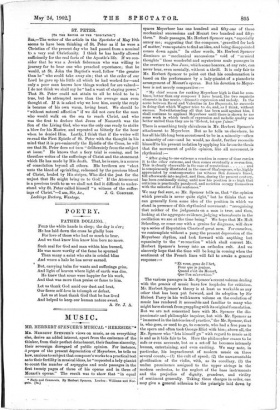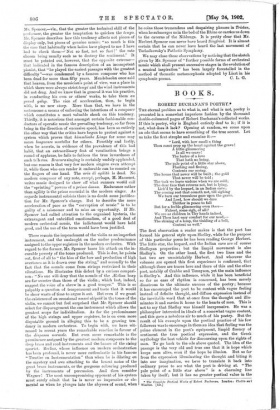M USIC.
MR. HERBERT SPENCER'S MUSICAL "HERESIES."*
Mn. HERBERT SPENCER'S views on music, as on everything else, derive an added interest, apart from the eminence of the thinker, from their perfect detachment, their fearless sincerity, their sovereign disregard of public opinion. For instance, a propos of the present depreciation of Meyerbeer, he tells us how, anxious to subject that composer's works to a practical test as to their fertility in musical ideas, he "requested a lady-pianist to count the number of arpeggios and scale passages in the first twenty pages of three of his operas and in three of Mozart's operas." The result was to show that "in equal • Facts and Comments. By Herbert Spencer. London : Williams and Nor- Sale. (60.) •
spaces Meyerbeer has one hundred and fifty-one of these mechanical successions and Mozart two hundred and fifty- three." Scale passages, Mr. Herbert Spencer says," especially annoy me; suggesting that the composer, 'gravelled for Lack of matter,' runs upstairs to find an idea, and being disappointed
comes down again." In other words, Mr. Herbert Spencer dismisses as "mechanical successions" void of " masical thoughts" those wonderful and mysterious scale passages in the overture to Don Juan, which some hearers, at any rate, can never hear, even mentally, without a thrill. It is only fair to
Mr. Herbert Spencer to point out that his condemnation is based on the performance by a lady-pianist of a pianoforte arrangement of Mozart's operas. But his devotion to Meyer- beer is not merely comparative:—
"My chief reason for ranking Meyerbeer high is that he com- bines, better than any composer I have heard, the two requisite elements in fine music,—dramatic expression and melody. In the semi° between Raoul and Valentine in Les Huguenots, he succeeds in doing that which Wagner tries to do, and, as I think, without success. Notwithstanding all that has been said against him, I shall continue to applaud Meyerbeer until there is shown to me some work in which truth of expression and melodic quality are better united than they are in 'Robert, toi que j'aime."
There is something truly chivalrous in Mr. Herbert Spencer's attachment to Meyerbeer. But as he tells us elsewhere, he has all his life long been accustomed to be in a minority—often a minority of one—and he would, no doubt, further reconcile himself to his present isolation by applying his favourite thesis that the movement of public opinion, like all movement, is rhythmical :—
" After going to one extreme a reaction in course of time carries it to the other extreme, and then comes eventually a re-reaction.
This is clearly observable in tho case of reputations and is conspicuously illustrated in the case of Shakespeare, who, highly appreciated by contemporaries (as witness Ben Jouson's lines), fell afterwards into neglect, and then, during the present century, has been continually rising, until now his position is so high that criticism is practically paralysed, and societies occupy themselves with the minuthe of his sentences."
We may feel sure, so Mr. Spencer tells us, that "the opinion which prevails is never quite right," but he thinks that we can generally form some idea of the position in which we stand in presence of this rhythmical movement : "recognising that neither of the judgments on a man is true, and then, looking at the aggregate evidence, judging whereabouts in the oscillation we are at the time being." We hope that Mr. Holt Schooling, or some one with a genius for diagrams, will draw up a series of Reputation Charts of great men. For ourselves, we contemplate without a pang the present depression of the Meyerbeer rhythm, and look forward with anything but equanimity to the " re-reaction " which shall convert Mr.
Herbert Spencer's heresy into an orthodox cult. And we sincerely hope that the time will be long in coming when the sentiment of the French lines will fail to awake a general
response :—
"Et vous, gens de l'Art, Pour qua je jouisse,
gnand c'est du Mozart,
Quo l'on m'avertisse."
The various passages in Mr. Spencer's recent volume dealing with the genesis of music leave few loopholes for criticism.
Mr. Herbert Spencer's theory is at least as workable as any other that has been put forward, and its adoption by Sir Hubert Parry in his well-known volume on the evolution of music has rendered it accessible and familiar to many who might have shrunk from grappling with its original formulation.
But we are not concerned here with Mr. Spencer the dis- passionate and philosophic inquirer, but with Mr. Spencer as "immersed in the intricacies of practice," the Mr. Spencer, that is, who goes, or used to go, to concerts, who had a free pass to the opera and often took George Eliot with him ; above all, the Mr. Spencer who "lets himself go" with regard to music as it is and as it bids fair to be. Here the philosopher ceases to be safe or even accurate, but as a set-off be becomes intensely human, entertaining, and even exciting. We may note, in particular, his impeachment of modern music on three several counts,—(l) the cult of speed; (2) the unwarrantable glorification of the violin, with, as its corollary, (3) the undue prominence assigned to the upper strings in the modern orchestra, to the neglect of the bass instruments and the prejudice of dignity, grandeur, and virility of sentiment generally. Taking these charges in order, one may give a general adhesion to the principle laid down by
Mr. Spencer,—viz., that the greater the technical skill of the performer, the greater the temptation to quicken the tempo. Mr. Spencer describes how this tendency affects not pieces of display only, but pieces of genuine music : "so much is this the case that habitually when ladies have played to me I have had to check them= Not so fast, not so fast !' the rate chosen being usually such as to destroy the sentiment." It must be pointed out, however, that the opposite extreme— that indicated in the famous description of an incompetent pianist, that "he played the easiest passages with the greatest difficulty "—was condemned by a famous composer who has been dead for more than fifty years. Mendelssohn once said that heaven, from the musician's point of view, was a place in which there were always strict tempi and the wind instruments did not drag. And we know that in general it was his practice, in conducting his own or others' works, to take them an grand galop. The vice of acceleration, then, to begin with, is no new story. More than that, we have in the metronome a means of enforcing the intentions of a composer which constitutes a most valuable check on this tendency. Thirdly, it is notorious that amongst certain fashionable con- ductors of operatic music the prevailing tendency, so far from being in the direction of excessive speed, has been so entirely the other way that the critics have begun to protest against a system which proves that himmlische Lange for some may mean longueurs mortelles for others. Fourthly and lastly, when he asserts, in evidence of the prevalence of this bad habit, that an extraordinary feat of vocalisation brings a round of applause, be fails to fathom the true inwardness of such tributes. Bravura singing is certainly unduly applauded, but one reason is that very few modern singers even attempt it, while those who can render it endurable can be counted on the fingers of one hand. The aria di agilita is dead. No modern composer of any note, except, perhaps, M. Massenet, writes music designed to show off what runners would call the "sprinting" powers of a prima donna. Endurance rather than agility is the prime essential in the modern singer. As regards instrumental soloists there is no doubt some justifica- tion for Mr. Spencer's charge. But to describe the mere acceleration of pace as the "corruption of music" is to be guilty of a misnomer and to miss an opportunity. If Mr. Spencer had called attention to the organised hysteria, the extravagant and unbridled emotionalism, of a good deal of modern orchestral music, the indictment would have held good, and the use of the term would have been justified.
There remain the impeachment of the violin as an imperfect instrument, and the onslaught on the undue predominance assigned to the upper registers in the modern orchestra. With regard to the former, Mr. Spencer bases hie attack on the in- curable poverty of the tones produced. This is due, he points out, first of all to "the hiss of the bow and production of high overtones as it is drawn over the string," and secondly to the fact that the sounds come from strings restrained in their vibrations. He illustrates this defect by a curious compari- son : "No one will deny that the sounds of the ./Eolian harp are far sweeter than those of the violin ; which last, indeed, suggest the voice of a shrew in a good temper." This is so palpably a question of temperament and taste that it would be sheer waste of time to argue it out. But even if we grant the existence of an occasional amari aliquid in the tones of the violin, we cannot but feel surprised that Mr. Spencer should select for disparagement the one instrument which allows the greatest scope for individualism. As for the predominance of the high strings and upper registers, be is on even more disputable ground in alleging this to be a growing ten- dency in modern orchestras. To begin with, we have wit- nessed in recent years the remarkable reaction in favour of the diapason normale. But even more remarkable is the prominence assigned by the greatest modern composers to the deep brass and reed instruments and the basses of the steing quartet. Berlioz, whose influence on modern orchestration has been profound, is never more enthusiastic in his famous "Treatise on Instrumentation" than when he is dilating on the mystery and awe attaching to the lowest notes of the great brass instruments, or the gorgeous colouring produced by the instruments of percussion. And then consider Wagner ! The most uncompromising opponent of his system must surely admit that ha is never so impressive or ele- mental as when be plunges into the abysses of sound, when he coins those tremendous and despairing phrases in Tristan, when he submerges us in the bed of the Rhine or carries us down to the caverns of the Niblungs. It is pretty clear that Mr. Herbert Spencer can never have heard Siegfried. It is almost certain that ha can never have heard the last movement of Tschaikowsky's Pathetic Symphony.
We may close these observations by noticing that the sketch given by Mr. Spencer of "further possible forms of orchestral music which shall present successive stages in the evolution of a musical inspiration" has been largely forestalled in the method of thematic metamorphosis adopted by Liszt in his







































 Previous page
Previous page